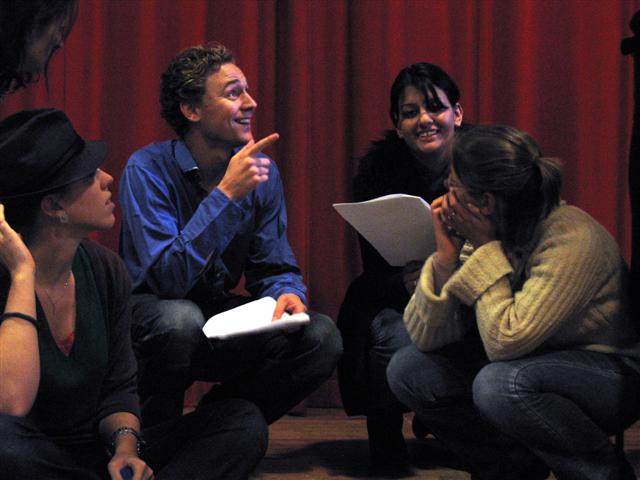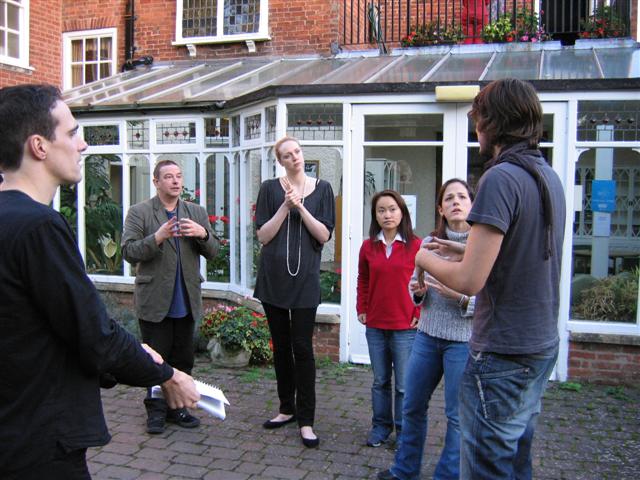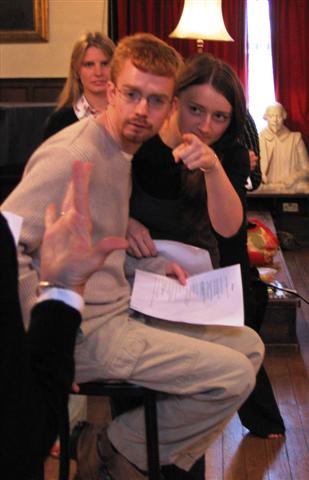Cheek by Jowl's Cymbeline
In October 2006 the CAPITAL Centre organised a four day workshop on Cymbeline in conjunction with theatre company Cheek by Jowl, bringing together academics, students, actors, directors and administrators, allowing students the opportunity to see the beginning of the creative process that eventually led to the company's critically-acclaimed production of Cymbeline.

The project was designed to test the CAPITAL Centre’s tenet that “the process of making theatre is a model for good practice in teaching and learning because a good student experience is akin to a good rehearsal process”. Cheek by Jowl brought its actors to the Shakespeare Institute in Stratford-upon-Avon for these "pre-rehearsal rehearsals", in which Owen Horsley, Assistant Director for the company, ran a series of workshops attended by postgraduate students taking the Warwick MA module in Shakespeare in Performance. They were also joined by Professor Carol Rutter and Dr Paul Prescott of Warwick, Dr Richard Rowland of the University of York and Professor Valerie Wayne of the University of Hawaii, who is currently editing the new Arden edition of Cymbeline.
The students had spent three weeks researching previous productions of the play in the RSC archive and compiling a portfolio of visual material and were trained to serve as dramaturges, acting as a resource on every aspect of the play for members of the company. The academic staff observed the process of rehearsal and offered input where invited. Responses were extremely favourable. Students remarked that “the combination of activities worked really well”, the practitioners were “enthusiastic people who uncovered so much richness in the text”, and the whole experience provided “a mine of fascinating information”.

Professor Carol Rutter, convenor of the workshop sessions
Our ultimate goal was a four-day intensive period of pre-rehearsal rehearsals exploring Cymbeline, the play the company would start to rehearse ‘for real’ in January 2007.
I had designed the module to give the MA students a total immersion experience. They were a mixed group: five Warwick ‘returners’; three overseas students; two mature students; five who were new to Warwick; one located in the Centre for the Study of the Renaissance; two in the Philosophy Department; some who had seen a lot of Shakespeare on stage; one who had seen virtually none. ‘Total immersion’ meant holding our weekly seminar at the Shakespeare Birthplace Trust where students were situated right on top of the Royal Shakespeare Company archives, archives that we accessed and used in every meeting; it meant going to the theatre to see the RSC’s Antony and Cleopatra and Julius Caesar in the first fortnight of term; it meant having a question and answer session with Harriet Walter (Cleopatra) and a 3-hour physical workshop with Steve Marmion (assistant director) on aspects of Antony and Cleopatra in that same fortnight; it meant starting to work on readings – from Barbara Hodgdon, William Worthen, et al. – that attend specifically to Shakespeare performance studies.
Specifically directed toward the Cymbeline project – a Romans-in-Britain play set in the aftermath of the death of Antony and Cleopatra when Augustus is emperor – students began working with performance materials at the Shakespeare Birthplace Trust. Cymbeline is an under-performed and under-studied play: it isn’t read on the Warwick undergraduate Shakespeare syllabus; none of the Cheek by Jowl team knew the play at all; neither did the MA students. We wanted to put together for the actors an academic support package that would consist of critical, theatrical and visual materials. We surveyed the scholarship on the play, compiling a selected, annotated bibliography of critical essays. We produced a synoptic cut promptbook text of Cymbeline as it has performed at the RSC since the 1930s, each student taking one production to ‘own’ and marking the cuts directors had made, ultimately transferring them onto a single book. The point of this exercise was to get students intensely interested not just in editorial matters but in theatrical practice: to familiarise them not just with the playtext but with its difficulties in performance (that readers can skip over but that actors must face up to). How do subsequent productions ‘do’ Jupiter? The headless corpse of Cloten? The bedroom scene with Imogen and Iachimo? The devilishly complicated narrative/story- telling opening? The endless (comic) revelations of the ending? Putting together the composite promptbook students could see which lines NO production had ever cut: that is, they could see the bare bones of the story-play. They could also see speeches that almost NO ONE had ever tried to make sense of on stage. Working on text (and with a number of editions) students acquainted themselves with the play-of-words that is Cymbeline. But they were also putting together for the actors a picture portfolio, production photographs in the main but also programme covers, poster images, visual materials reproduced from the programmes that ‘fixed’ the frame of reference for individual productions, the ‘look’ of the play in terms of casting (one production had the Queen go everywhere with her dwarf), costumes, set, spectacle (a number of Jupiters, from disembodied voice-over to full apocalyptic descent on the back of the eagle). These picture portfolios documented Cymbelines set in ‘authentic’ Roman Britain; the Britain of Grimm’s fairy tales (or Rackham’s weirdest blighted English countryside); a Japan-ised Britain; a never-never Britain where the Queen had stepped out of Cinderella and the courtiers all wore white satin; Cymbeline played as chamber play or as epic.
This prep material was our gift to the actors when we met on October 23 at the Shakespeare Institute in Stratford-uon-Avon. Their gift to us was to ignore it for three days while we started working on the play physically. Some of the actors had been cast in roles they would eventually play. (We had our Posthumus, who was also going to double Cloten; our Queen; our Imogen; our Doctor; one of the Lost Boys). Some of the actors were there on spec. On the academic side, we’d picked up two reinforcements: Val Wayne who is editing Cymbeline and has been working seriously on the play for eleven years; Richard Rowland who has extensive knowledge of Jacobean theatre texts and their performances.
Starting on the physical, we did a complete range of warm-ups and icebreakers; we moved to a read-through of the play, sharing parts around the circle, speech after speech; we paused for general comments/questions (why doesn't the Queen havea name?); and then we started on what the assistant director, schooled in Cheek by Jowl's rehearsals method, thinks of as the critical work of rehearsal, telling the story of the play. Students and actors worked side by side: on text; without text; with bodies; with movement; with objects; with invented music; with various voices; writing things down; extracting; cutting away to what, four days later, they 'showed' as a sequence of 'shorts' - the heart of the play called Cymbeline. The process was intense; relentless; exhausting - and exhilarating. Everything was admissible. Everything was material for work-in-progress. When the actors turned to the portfolios the students had put together, they were delighted to get their hands on the material.

Pete Kirwan, student participant in the project
In November 2006 I was presented with a unique opportunity by the CAPITAL Centre- the opportunity to work with acclaimed theatre company Cheek By Jowl for four days in the pre-rehearsal period for their new production of Cymbeline.
For a group of students studying the play in a performance context at postgraduate level, this was a rare opportunity to work intensively with a top theatre company. We were joined by several members of the acting company, the assistant director, stage manager, administrator and executive manager of the company, in addition to academics working on the play from a variety of perspectives.
This four day ‘boot camp’ on Cymbeline was a rich and highly productive learning experience for all involved. Many of the company had never encountered the play before and were only meeting each other for the first time, which gave the students a tremendous responsibility of helping introduce the company to the text, sharing the archival research we had done and talking about aspects of the play. Students prepared a prompt book for the company, compiled from a variety of critical editions, and also prepared a portfolio of critical essays, production photographs and performance histories of the play to help inform the decisions of the company.
In return, we gained a nuts-and-bolts insight into how performers approach a play from the first day. Apart from a sit-down read-through of the text, the experience was creative and practical for the whole period, with students and actors working together in small groups to workshop scenes and short sections, eventually piecing together a devised version of the entire play on the final day. This allowed for artistic exchanges both ways. Actor Tom Hiddleston later commented, “My Cloten – it’s all Chrissie!” (a student on the workshop), and another commented, “I will start rehearsals with a clearer understanding of the play as a whole”.
In addition, the experience opened our eyes to less publicly obvious areas of the arts world. The most important session for me personally was run by the administrator and executive manager of Cheek By Jowl, explaining the work done in administering an internationally touring theatre company. This was a particularly inspiring session which has gone on to inform my new career working alongside theatre companies within the CAPITAL Centre.
The workshop was complemented several months later by a trip to see the finished production in London. Not only did students enjoy the chance to meet up again with the company members who had attended the workshop, but also it allowed us to see how the workshop had impacted on the finished production; small ideas from staging options to aspects of one character’s performance had been retained for performance. This experience brought students firmly into the performance arena, introducing us to the arts world in a unique and highly exciting way.
